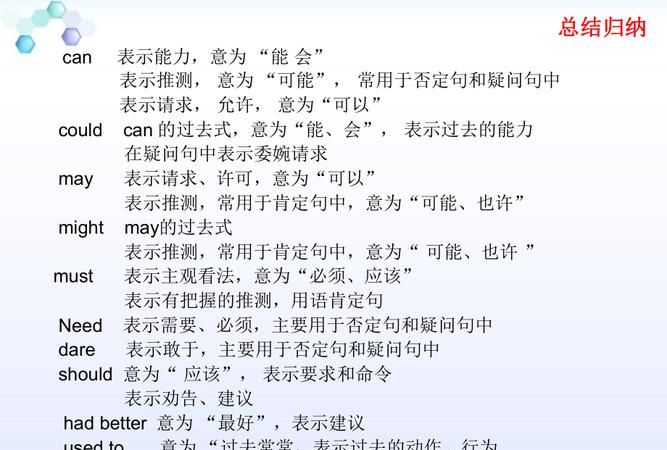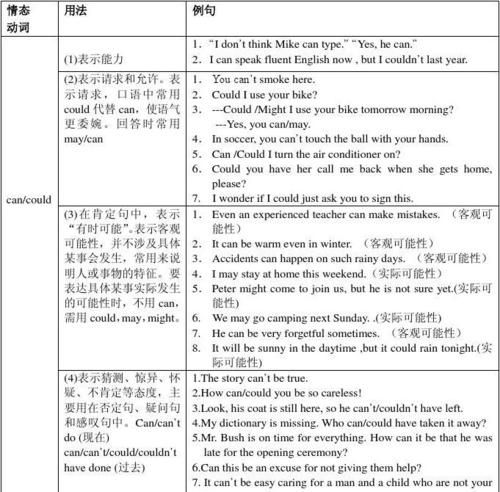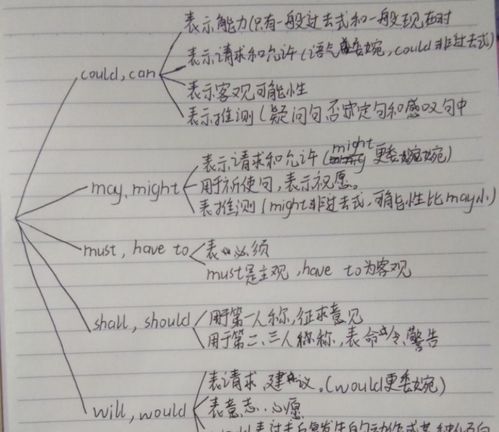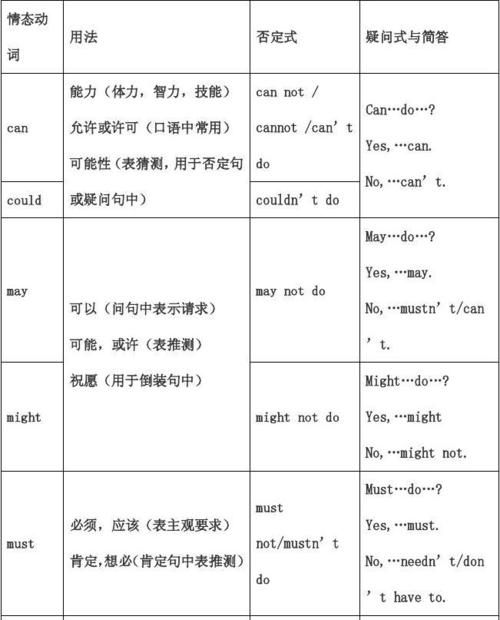提到小学情态动词知识点整理 想必大家一知半解。有必要科普一下,2019年小学英语知识点汇总:动词和小学一般常见的情态动词有哪些?小学情态动词知识点整理 的内容,令您更加清楚了解小学英语中的情态动词有哪些,来深入了解。
小学情态动词知识点整理 :初高中情态动词的知识点总结
情态动词有can (could), may (might), must, have to, shall (should, will (would), dare (dared), need (needed), ought to等。 情态动词无人称和数的变化;不能单独使用,必须与其后的动词原形构成谓语
一、 can, could
1) 表示能力(体力、知识、技能)。
Can you lift this heavy box?(体力)
Mary can speak three languages.(知识)
Can you skate?(技能)
此时可用be able to代替。Can只有一般现在时和一般过去式;而be able to则有更多的时态。
I’ll not be able to come this afternoon.
当表示“经过努力才得以做成功某事”时应用be able to,不能用Can。如:
He was able to go to the party yesterday evening in spite of the heavy rain.
2) 表示请求和允许。
-----Can I go now?
----- Yes, you can. / No, you can’t.
此时可与may互换。在疑问句中还可用could,
might代替,不是过去式,只是语气更委婉,不能用于肯定句和答语中。
---- Could I come to see you tomorrow?
---- Yes, you can. ( No, I’m afraid not. )
3) 表示客观可能性(客观原因形成的能力)。
They’ve changed the timetable, so we can go by bus instead.
This hall can hold 500 people at least.
4) 表示推测(惊讶、怀疑、不相信的态度),用于疑问句、否定句和感叹句中。
Can this be true?
This can’t be done by him.
How can this be true?
二、 may, might
1) 表示请求和允许。might比 may语气更委婉,而不是过去式。否定回答时可用can’t
或mustn’t,表示“不可以,禁止”。
----Might/ May I smoke in this room?
---- No, you mustn’t.
---- May/Might I take this book out of the room?
---- Yes, you can. (No, you can’t / mustn’t. )
用May I...?征徇对方许可时比较正式和客气,而用Can I...?在口语中更常见。
2)用于祈使句,表示祝愿。
May you succeed!
3) 表示推测、可能性(不用于疑问句)。
might不是过去式,它所表示的可能性比may小。
1.He may /might be very busy now.
2.Your mother may /might not know the truth.
三、 must, have to
1) 表示必须、必要。
You must come in time.
在回答引出的问句时,如果是否定的,不能用mustn’t(禁止,不准),而用needn’t, don’t have to(不必).
---- Must we hand in our exercise books today?
---- Yes, you must.
---- No, you don’t have to / you needn’t.
2) must是说话人的主观看法, 而have to则强调客观需要。Must只有一般现在时, have to 有更多的时态形式。
1. he play isn’t interesting, I really must go now.
2. I had to work when I was your age.
3) 表示推测、可能性(只用于肯定的陈述句)
1. You’re Tom’s good friend, so you must know what he likes best.
2. Your mother must be waiting for you now.
四、 dare, need
1) dare作情态动词用时, 常用于疑问句、否定句和条件从句中, 过去式形式为dared。
1. How dare you say I’m unfair?
2. He daren’t speak English before such a crowd, dare he?
3. If we dared not go there that day, we couldn’t get the beautiful flowers.
2) need 作情态动词用时, 常用于疑问句、否定句。在肯定句中一般用must, have to, ought to, should代替。
1.You needn’t come so early.
2. ---- Need I finish the work today?
---- Yes, you must. / No, you needn’t.
3) dare和 need作实义动词用时, 有人称、时态和数的变化。在肯定句中,dare后面常接带to的不定式。在疑问句和否定句中,dare后面可接带to或不带to的不定式。而need后面只能接带to的不定式。
1. I dare to swim across this river.
2. He doesn’t dare (to) answer.
3. He needs to finish his homework today.
五、 shall, should
1) shall 用于第一人称,征求对方的意见。
What shall we do this evening?
2) shall 用于第二、三人称,表示说话人给对方的命令、警告、允诺或威胁。
1. You shall fail if you don’t work hard.(警告)
2. He shall have the book when I finish it.(允诺)
3. He shall be punished.(威胁)
六、 will, would
1) 表示请求、建议等,would更委婉。
Will / Would you pass me the ball, please?
2) 表示意志、愿望和决心。
1. I will never do that again.
2. They asked him if he would go abroad.
3) would表示过去反复发生的动作或某种倾向。would表示过去习惯时比used to正式,且没有“现已无此习惯”的含义。
1. During the vacation, he would visit me every other day.
2. The wound would not heal.
4) 表示估计和猜想。
It would be about ten o’clock when she left home.
七、 should, ought to
1) should, ought to表示“应该”,ought to表示义务或责任,比should语气重。
1. I should help her because she is in trouble.
2. You ought to take care of the baby.
2) 表示劝告、建议和命令。should, ought to可通用,但在疑问句中常用should。
1. You should / ought to go to class right away.
2. Should I open the window?
3) 表示推测
should , ought to (客观推测), must(主观推测)。
1.He must be home by now. (断定他已到家)
2.He ought to/should be home by now.(不太肯定)
3. This is where the oil must be.(直爽)
4. This is where the oil ought to/should be.(含蓄)

小学情态动词知识点整理 :小学情态动词的用法总结
can+动词原型,can与be动词差不多的,一般疑问句也是一样的,提前can,改我为你,句号变问号,回答是yes,I can/no,I can't............就这些吧

小学情态动词知识点整理 :小学英语的基础知识
1. be 动词有三个(am/ is/ are) 中文的意思:“是”,如:I am a nurse. 我是一个护士。He is a doctor. 他是一个医生。 We are good friends. 我们是好朋友。其否定句只要在这三个字面加上not; 一般疑问句只要把这三个字提前到句首,然后在句尾加上“?” 即可。
2....小学英语中助动词有两个(do/ does)否定形式是(don't/ doesn't)在句中与行为动词原形连用,构成疑问句或否定句结构。如:She sings well. She doesn't sing well. Does she sing well? We watch TV every day. We don't watch TV every day.
Do you watch TV every day?
3. 小学英语中情态动词有三个(may/ can/ must) 可以,能、会,必须,本身不能单独使用;同样要和行为动词原形一起连用才能构成句子谓语部分。否定句是在这三个字后面加“not” 一般疑问句时,把这三个字提到句首,句尾加"?". 如:We must go along the road on the right. We must play football in the street.
Must we hand in our homework now? May I come in? Can you swim?
I can't cook. I can wash my clothes.
希望能帮到你。

小学情态动词知识点整理 :有关中考英语“情态动词”知识点都有哪些
情态动词是用来表示意愿、主观想法。不能独立作为句子成分出现,通常是和谓语动词原形一起使用。常见的情态动词如,can能够,must必须,should应该,
need需要 等等。用法是:情态动词+动词原形

以上就是关于小学情态动词知识点整理 ,小学英语中的情态动词有哪些的全部内容,以及小学情态动词知识点整理 的相关内容,希望能够帮到您。

